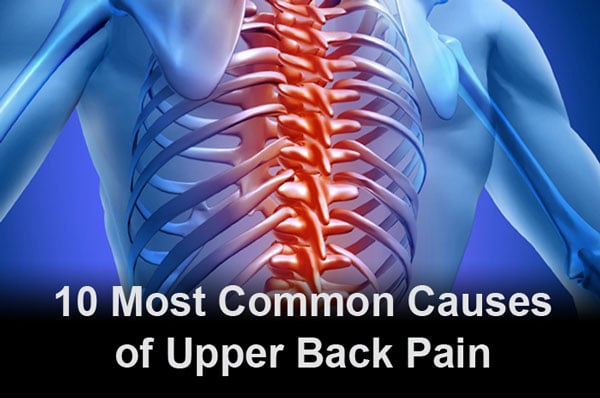Most of us will suffer from back pain in our lifetime. Upper back pain and lower back pain can be different in the way they present and their underlying cause. Here are some common causes of upper back pain. There are many Denton, Texas chiropractors and doctors to help determine the cause of your pain.
1. Poor posture
As more jobs require long hours in a desk chair in front of a computer, more patients have trouble with upper back pain. Most office work spaces are not ergonomic or suited for long term use. Without the right accommodations, sitting in an office chair and doing computer work can take a toll on your posture. Too often, employees tend to lean forward and curl around a computer. This puts stress on the neck and upper back muscles.
Its best to work at a desk with your hips all the way back into the chair and your feet flat on the floor. Your spine and neck should be as straight and natural as possible. Take frequent breaks to get up and stretch or take a walk.
Also, pay attention to your poor posture during other parts of the day. When we stand naturally, we tend to lean our heads forward and curl the upper back. Stretch your neck and upper back muscles daily. When you stand, it’s recommended that your ears are directly over your shoulders and your shoulders are back.
2. Stress
Emotional and physical stress worsens chronic illness and pain. It is possible to carry stress in the neck and upper back. Depression and anxiety often go hand in hand with chronic upper and lower back pain. Always take care of yourself. When possible, cut down the number of hours you work or take on different responsibilities. Spend time with supportive friends and family members. Give yourself time to unwind at the end of a busy day.
3. Injury
People who have been in an automobile or any type of accident are at high risk for upper back pain. Pain from treatable injuries can often last far beyond the time it takes to heal. If you have been in an accident and are experiencing upper back pain, don’t wait until it becomes unbearable to seek treatment from a doctor or chiropractor.
4. Muscular irritation
Most commonly, muscular irritation happens from overuse or repetitive motions. Even working or typing at a desk can be hazardous for your neck and upper back. Jobs that require you to stoop over or do heavy lifting will also put you at risk. If your job or lifestyle requires repetitive motions, take as many breaks as you can during your day to walk around and stretch.
5. Neck and shoulder pain
Upper back pain is common in people who also have neck and shoulder pain. The more pain you have, the more you tense your muscles around where you have pain. This causes more widespread pain. Work with a doctor or chiropractor and tell them any place you suffer from pain. Get a massage or learn some exercises designed to relieve neck pain, shoulder pain, and upper back pain. If you can relieve the neck and shoulder pain and tension, the upper back pain may lessen as well.
6. Disk herniation or degeneration
Disk herniation or degeneration most often occurs in the lower back. Disk herniation or degeneration in the upper back is rare, but it is possible. About one percent of cases can occur in the upper back.
7. Chronic illness
People who suffer from arthritis or fibromyalgia are at more risk of chronic upper back pain. If you suffer from these conditions or have them in your family history, consult with a doctor on the best course of treatment. Do your best to maintain a healthy lifestyle with a healthy diet and exercise.
8. Obesity
The more weight you have, the more your spine and muscles have to adjust to carry that weight. Today’s culture of eating processed and fast foods with a high number of calories has resulted in enormous weight gain. Make an effort to eat a reasonably healthy diet with plenty of fruits and vegetables. Even the loss of a few pounds can make a difference on the amount of upper or lower back pain you have.
9. Sedentary lifestyle
If you work at a desk, lay in bed, or sit on the couch for a long time, you will have more upper back pain. If you spend most of your day sitting or lying down, you are at high risk for upper back pain. If you have chronic upper back pain that lasts days or weeks, you may want to stay still, but this may make your pain worse.
Exercise strengthens the muscles and ligaments in the upper back and neck. When you strengthen your muscles and keep exercising regularly, your muscles are better able to support your body.
If you are not used to exercise, try walking or yoga. Even ten minutes of stretching a day can make a difference in the amount of upper back pain you have.
10. How you sleep
Make sure your mattress is not too old and in good condition. The mattress should be firm and provide support for your body while you sleep. The mattress should mold to the shape of your body, but not so much that you sink in whenever you lay down. There should not be any air between your body and the mattress when you lay down.
Pay attention to how your upper back feels when you get up in the morning. If you are often in pain upon waking up, it might be time for a new bed.

